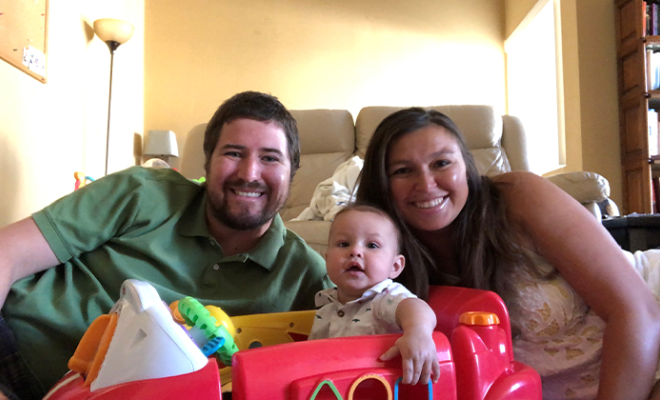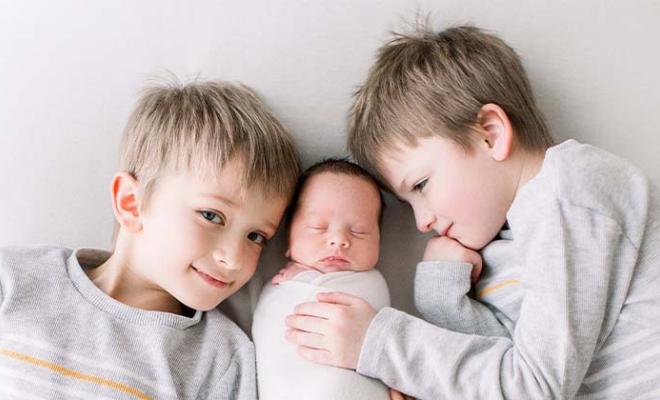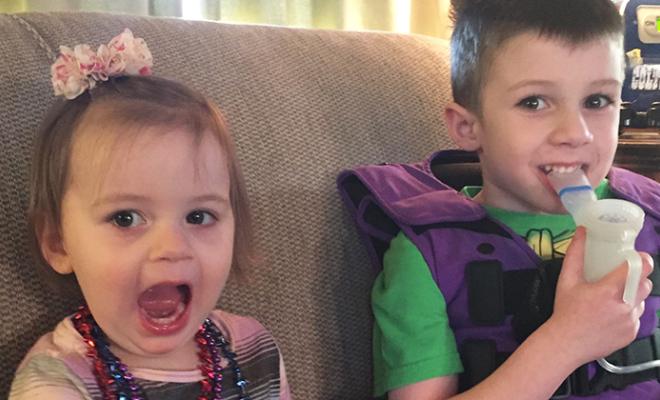I would have argued the newborn screening result until my face turned blue. There was no way my baby had cystic fibrosis. My prenatal screening was negative, and I believed it showed that my son was not at risk for CF. Not to mention, we have a 5-year-old with no health complications — other than he swells up like a balloon if he licks a peanut. However, after a repeat newborn screen and a sweat test here we are; and I think I will ask “why” for the rest of my life.
Of course, we got the news on a Friday, which left us in a dark and scary Google search hole over the weekend. “What is cystic fibrosis?” “How does someone get it?” “Can we just get rid of it?” We had never really heard of CF. No one in either of our families has it — or had it. None of our friends or any of their children have it.
I cried. Boy, did I cry. I screamed, I cursed, I prayed, and I cried some more. I felt my son, Colton, had a time clock stamped on his back that I could never remove for him. I felt he was cheated, given a life he didn’t ask for. Postpartum life is hard. Being told your baby has a life-shortening disease is harder.
I imagine this is a common reaction for other parents who receive this kind of news in this way. So, I did what any other millennial parent would do — I took to social media. Turns out, my story isn’t uncommon. In fact, after asking if anyone could relate, I received dozens of responses. “I wish I would’ve known so I could have prepared. His entrance into the world would have been a lot less traumatic.” “I was very confused.” “So much could have been prevented if we knew what we were dealing with.”
“It would have softened the blow if we had known in advance…”
These responses came from far and wide, from here in Colorado, New York, New Zealand, and the U.K. Though we know very little of each other, we have two things in common: we were blindsided, and we are angry.
A common type of prenatal screening called noninvasive prenatal testing (NIPT) is typically done between the 10th and 13th weeks of pregnancy. This blood test looks for certain genetic birth defects in the baby such as Down syndrome, trisomy-18, sickle cell disease, and of course, cystic fibrosis. My test came back negative for all. Why? Because prenatal screenings only test for, on average, 34 of the most common mutations for CF.
More than 2,000 CF mutations have been identified. Not all of them cause CF and some occur more frequently than others. So, if you are given a NEGATIVE prenatal test result and believe it means you aren’t a CF carrier, just know they only tested for about 1.7% of the total possible gene mutations for the disease. There is no guarantee that screening for more mutations would have given us a different result, and the list of mutations is still growing, but the odds would certainly have been better.
Maybe it’s time to expand the mutations that are screened. So, who can we talk to about this? Who can we write a strongly worded letter to? Dare I go there and ask ... who do we vote for?
“My screening came back negative because my mutation is rare. I had no idea that this was even possible. I was in complete shock!!! I think ours only tested for 19. Like 19 out of 2000 is really going to help…”
The diagnosis wouldn’t have changed, but we would have been able to better prepare if we had known. In my case, I would have had over six months before my son was born to grieve, research, meet the CF team, and ask questions. We found out my son has CF a month after he was born, and I am still playing catchup on my learning and understanding ten months later. When the diagnosis is known, the newborn can start treatments right away, and in some cases, using it off-label while still in the womb. The sooner you can start treatments, the better the chance of a healthier life. My son was near “failure to thrive” for his first three weeks of life because no matter how much we fed him, he was losing weight. At his two-week checkup, the pediatrician told us if we did not get our son to gain weight, he would become jaundiced and that could lead to possible brain damage. I was feeding that baby nonstop!
As soon as we had our first appointment with the incredible CF team in Denver, he was able to start enzymes and started packing on the pounds. It seemed like he became so much healthier overnight. A month after birth, we now have the right treatments, the right team, the right diagnosis. Our son has cystic fibrosis, cystic fibrosis does not have our son.
Knowing my son has the exact same disease that, in the past, did not allow children to live past age 5, is a hard enzyme to swallow. A part of our everyday life now consists of inhalers, nebulizers, chest physiotherapy, salt, enzymes with every meal, and the uncertainty of his future. A larger part of our everyday now consists of giggles, smiles, making memories, and absolute pure joy.
Yes, our hands our full … but thank God they aren’t empty.
Interested in sharing your story? The CF Community Blog wants to hear from you.





